By Topden Tsering
Review of “Another Place” by Tsering Wangyal a.k.a Editor
Late Tsering Wangyal, author of the landmark Tibetan novel in English, “Another Place,” was less known by his name than his nickname: Editor. The man’s identity consisted not of words given by Tibetan religious lamas who can often fall susceptible to inconsistencies: think of Paljors who are dirt poor, Sangmos who are downright evil, Jinpas who are incorrigible misers, and the ubiquitous Tenzins who give the ideal Buddhist a bad name.
The man was his work. He was the words he banged away on his typewriter to knock out issues, month after month, of “Tibetan Review,” of which he was the Editor from mid 1970s until his resignation in 1996. In the Tibetan reading world, this independent English language periodical, published in Delhi, was most anticipated for its editorials. These one or two-page write-ups unfailingly offered ruthless, and sometimes humorous, dressing downs of the politicians and civil servants in Central Tibetan Administration (CTA) or Tibetan Government-in-Exile in Dharamshala, India. They put up an unflattering mirror to the naïve, misguided, occasionally stupid and sometimes corrupt ways in which the power wielders handled the Tibetan freedom struggle and Tibetan democracy. No one—except the Dalai Lama—was exempt from his sarcastic incriminations.
Editor’s editorials worked largely because his writing was simple and straightforward, the first rule of good journalism. The wit was a bonus. Editor’s debut novel (also tragically his last), “Another Place,” the manuscript for which was found after his untimely death, at 51, in Canada in 1999, works mostly because it talks about the world he knew: the default device—some call it autobiographical—for the less grounded and more imaginative literary form: Fiction. After all, for at least twenty years, he had closely held a microscope to the Tibetan political life (and what is Tibetan life if not political?).
Not one wart was hidden from him. Not one fart escaped his notice.
The writing in “Another Place” is also simple and straightforward, as the opening of the book, “Everything seemed simple and straightforward then,” suggests. The techniques Editor employs (the tense lapse is intentional) are more conventional than experimental, relying on the dependable third-person point of view. While the plot is driven by linear progression, the book is rife with flashbacks, which exercise Editor pulls off brilliantly.
The novel is outstanding for its characters. If you had lived in Dharamsala in the 1990s, chances are you’d see yourself in one of them. As working in an office in Gyangkyi. As walking around aimlessly in Mcleod Gunj. As washing your clothes in the river in Bhangsunath. As sipping on Ginger Lemon Tea in Kailash Hotel while surveying, through the window, the goings on in the streets below. And as drinking away at the bar in Hotel Tibet, first exchanging pleasantries and small talks; next, after the third or fourth rounds of Kingfisher Beer, discussing politics with a passion bordering on murder; and then, few moments later, your arms wrapped around each other, singing, with equal fervor, old Bollywood songs—as though your next destination was raunchy gay sex.
The protagonist is Ngawang Tsultrim aka Frank Lee, a 31-year-old, Fulbright-returned, Deputy Secretary at CTA’s Department of Information & International Relations, “the most political office of Tibetan Government-in-Exile.” Like the writer, the main character too is known more by his nickname, although his alias has less to do with any impactful calling and more to do with the typical Tibetan school molestation of English and gift for unforgiving name-calling. I will not disclose the origin of the curious nickname and instead offer a similar example.
Growing up in Mcleod Gunj, my friends and I looked up to this young man, older than us by eight or nine years, whose skin was a shade darker than average Tibetan and whose face was sharp featured. Athletic of build, he possessed sinewy muscles, and people called him “Ali” which we had assumed was in reference to the world boxing champion. Many years later, after we became friends and during one of our joint-smoking sessions at the bend halfway to Bhagsu, he told me the origin story. He was around nine in a Tibetan school and while in the classroom the students heard a helicopter flying overhead. Excited they ran outside to catch a glimpse of the aircraft. Among them was my friend, who, pointing his finger to the air, was shouting: “Ali Kapta, Ali Kapta.” “Ali” got stuck to him like glue; of his real name, I have no clue.
Frank Lee is surrounded by an assortment of interesting characters. Among them is Thupten Chodrak, owner of “One More Chance Restaurant” in Bhagsunath, formerly in the 22 Army Establishment before he had been dishonorably discharged and soon after which, at the main temple in “Mola Ganji,” he had vowed never to touch alcohol again, leading to not just the lucrative business but also political ambitions; “If he had his way, Thupten would even join the Tibetan Women’s Association,” one of Frank’s friends quips.
There is also: Anthony Sinclair-Davis ,“Tony,” an actual Injie from England, who is writing a dissertation on Tibetan democracy, who is never seen without his rucksack, and who shares a deep friendship with Frank, the two having first met after the latter had been assigned to show the former around town, arranging interviews for his thesis; now they are drinking buddies and equal voyeurs of Tibetan beauties and classical music such as Beethovan’s Moonlight Sonata. Tenzin Lhakyi is Frank’s new wife, currently in the U.S. under the Tibetan Resettlement Project, waiting to be “re-united” with her husband, who, on their first meeting, had found her to be like “young Elizabeth Taylor in the role of Cleopatra”. Frank had met her while she was working as a nurse at Holy Family Hospital in Delhi, and on their first date, during a slow dance at a wedding party in Majnu Ka Tilla, the two kisses uninhibitedly, several times.
Pema Choezom is a ravishing beauty and source of Frank’s unrequited love. After studying until Class X at Loreto School in Darjeeling, her strict father moved the family to Dharamsala, where she was admitted to Upper TCV School, which, as Editor writes, “launched her distinguished career of breaking hearts, left, right and center.” Pema eventually joins Lady Shri Ram (LSR) College to study English Honors (the same subject that Frank had taken while at St. Stephen’s College several years earlier; the same subject yours truly took, while failing to attend many classes, in the nearby Hans Raj College; and the same subject that claimed half the Tibetan college-going population in Delhi). Despite Pema’s disciplinarian father and her rejection of Frank’s overture, in a dimly-lit Video Parlor showing pirated and poor quality tape of a Hollywood film, Pema demonstrates adventurous sexual streaks; reminiscing about one of her lovers who had ejaculated prematurely, she writes: “Poor chap. I hope he has found a good teacher by now.”
Pema’s father is Jhangsur, former governor of Phari in Tibet, now head of the Tibetan Medical Institute, an avid reader of Sheja, Tibetan language newspaper, and a more avid writer of opinion letters which he’d plaster on the Notice Board outside Gyangkyi’s staff mess. While the majority posters of such leaflets remained anonymous, Jhangsur attached his signature to all his letters, including those criticizing the Tibetan government for trading independence as goal for Tibet for genuine autonomy. (Take that all you sissy fake Facebook account holders, using your anonymity to discredit and injure people whose opinions you do not agree with). A self-made pompous man with lofty political ambitions, he scoffs equally at low-ranking civil servants and those vying for his beautiful daughter’s attention.
Editor is in high literary form when he introduces an ingenious arc involving Jhangsur’s possessiveness over his young wife, in the novel’s Prologue, and, toward the end, Chok Shamten, the handsome peasant Jhangsur banished out from Phari, “never to return,” because the governor’s beautiful wife had smiled on the innocent, hardworking man in the book’s first couple of pages.
The remaining cast comprises of men and women working in the various offices and institutions in and around Dharamsala. Then there is Sexy Migsy, a thirty-something-year-old Tibetan woman named Migmar, a mother of two, whose Home Department-employee husband is perennially on “Out of Station” duty, and “who is rumored to be bestowing carnal pleasures on some young man in Gangkyi.”
The book is equally about places: Dharamsala, Gangchen Kyishong and its many office buildings and staff quarters, the streets of McLeod Gunj, Hotel Tibet Bar, Office of Tibet in Delhi, etc. Most of the action takes place in One More Chance Restaurant in Bhagsunath where Frank and his friends, office workers from Gangkyi and teachers from TCV, gather to play “Paglug,” a popular Tibetan card game variation of Indian Rummy. The fictional restaurant’s name is a clever play on an actual eatery “Last Chance Restaurant” that stood at the bend halfway to Bhagsunath where Ali had shared with me his alias’s story.
Midway through it, I felt the book’s title lightweight, almost anti-climactic. The book was essentially about a time in history—1995 through 1999—which carried, within the span of mere four years, the full weight of history. With 1995 as the year of the story’s beginning, most of the important events related to Tibet had unfolded in the last ten years. 1987-1989: popular uprisings in Tibet resulting in Martial Law. 1987: the Dalai Lama’s Five Point Peace Plan. 1988: the Strasbourg Proposal. 1989: the conferment of Nobel Peace Prize to the Dalai Lama. 1989: Tiananmen Square Massacre. 1989: Launch of the Fulbright “Halfbright” Scholarship. 1990: the U.S. Tibetan Resettlement Project. The period saw the peaking of international support for Tibet with the passing of innumerable legislations and resolutions; the zenith was perhaps around the time the Hollywood films “Kundun” and “Seven Years in Tibet” released. So why not call the book “Another Time,” which was still not a great name, but it was at least less self-effacing?
Then it struck me. To Tibetans: time and place are interchangeable, carrying equal significances, portending similar omens. A sharp red line was drawn across our history when the Dalai Lama, followed by hundreds of thousands of his people, left Tibet for India. Another red line, whose positive or negative outcomes will be established over time, was drawn when the migration continued Westward, the United States then, now across the whole Europe. While there is no way for me to ascertain since Editor is not around, I marvel at the possibility that this might have been his suggestion: that when we leave one place for another, we also leave one time in history for another.
Alternately, when we left a specific time in history, we entered a different place – India and Nepal. When we left a specific place in the world, we entered a different time – the U.S. and the West, and with them their dizzying realities, challenges and opportunities, complete with decidedly different time zones. After all, Frank Lee, by the end of the novel, embarks on a new life in Colorado in the U.S.
The book is also about the disappearance of a laptop computer, the effort to locate which forms the crux of the plot. The electronics had cost Frank most of the savings he had put together working at a Tibetan restaurant in Queens while completing his one-year program at a school in New York. Despite this scholarship to study Political Science at the American university, Frank is unremarkable in his work and ambitions.
Barring his lackluster aptitude or skills, Frank shares a lot with Editor. Among them are the writer’s disdain for mainstream Bollywood films, his appreciation of world cinema, and his love for classical music, the Soprano and the like. The protagonist also reveals a cosmopolitan consciousness that is unique to Editor’s understanding of the time and the world he lived in. Throughout the novel, Frank sports a crew-cut, inspired by Richard Gere’s hairstyle in “An Officer and the Gentleman,” and later reinforced by his knowledge that Pema likened herself to Cindy Crawford. A big poster of the American actor adorns one side of his wall; then thinking that people might consider him gay, next to it he puts up a picture of Madonna. This possibility might have come to Frank only because he had been in the U.S.; otherwise it is unlikely for men in India at that time to worry about being labelled gay for putting up the poster of a male icon.
Other such expressions of awareness include how much sexually liberated his female characters are. Be it Pema Choezom, Tenzin Lhakyi, or Sexy Migsy, they do not think twice about kissing back, having sex, and kicking men in the groins if they so prove deserving.
Editor’s trademark witticism permeates the novel. One of the people who offers to help Frank in recovering his laptop is Lobsang, the eldest card player of the Paglug gang, and a member of the Assembly of Tibetan People’s Deputies, or the exile Tibetan parliament; he reckons he should at least appear to be concerned or try to solve the mystery: “Reputation built on that alone might secure his re-election to the Assembly next year.” While establishing Pema’s desirability early on, Editor writes, “the unflattering TCV uniform hardly intervened with her looks.” About the smile of Thupten’s daughter, Tenzin Bhuti, the writer says: “the exercise had the effect of transforming her eyes into two short, straight lines.”
Equal to the fun Editor has with sex scenes, both suggested and explicit, he provides himself generous literary treats by mentioning Tibetan Review a few times. Once, elderly Nowrojee, Proprieter of Nowrojee and Sons, complains to Frank about not receiving the magazine issues on time. At another time, Editor has Tony interviewing the Editor of Tibetan Review about Tibetan democracy, a contrivance possible only in novels.
It has been more than 20 years since Editor passed on. But I take it both the book and this creative device were his way of extending a beer bottle, with a Dunhill cigarette between his fingers, from his “Another Place” to ours, and saying: “Cheers!”
(Views expressed are his own)
The writer is a former Editor of Tibetan Bulletin. He is based in San Francisco Bay Area, US.


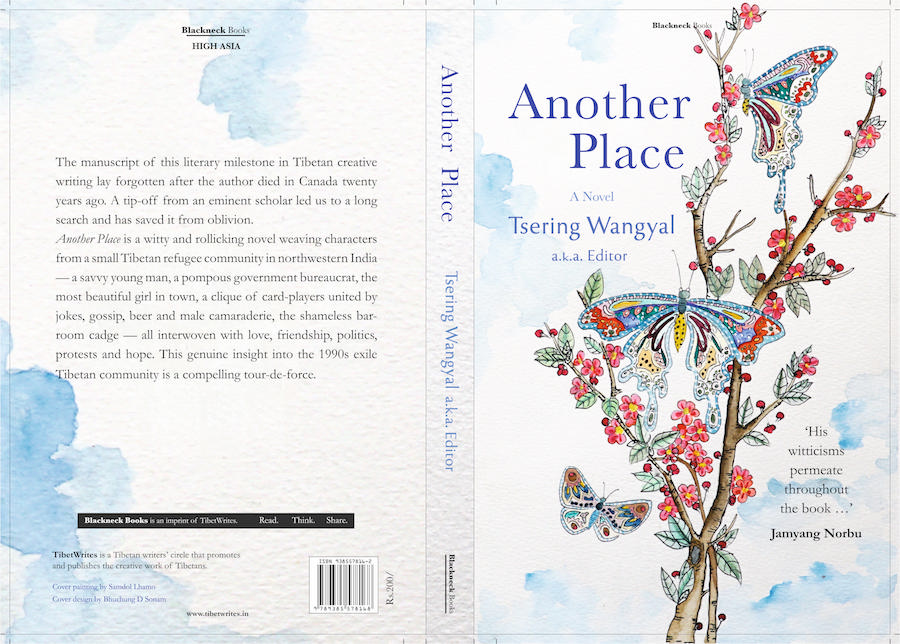




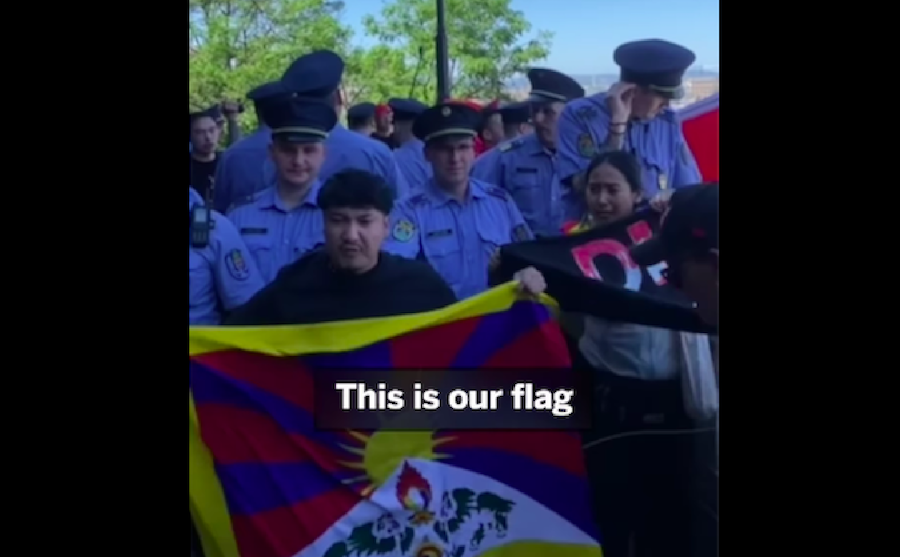
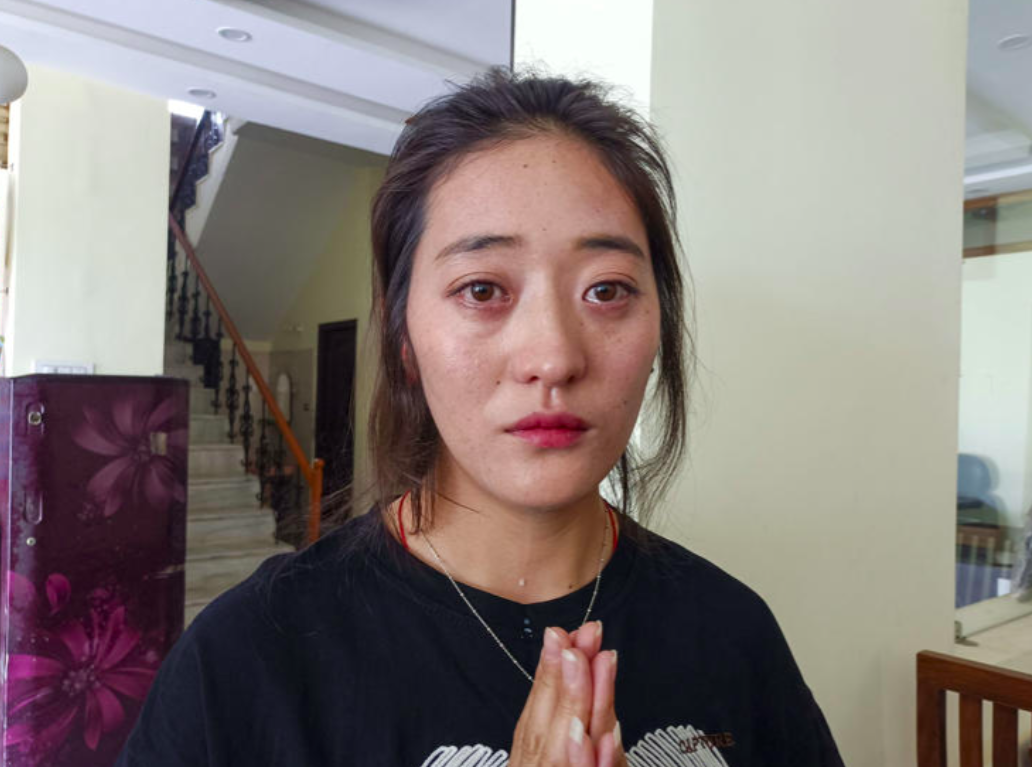
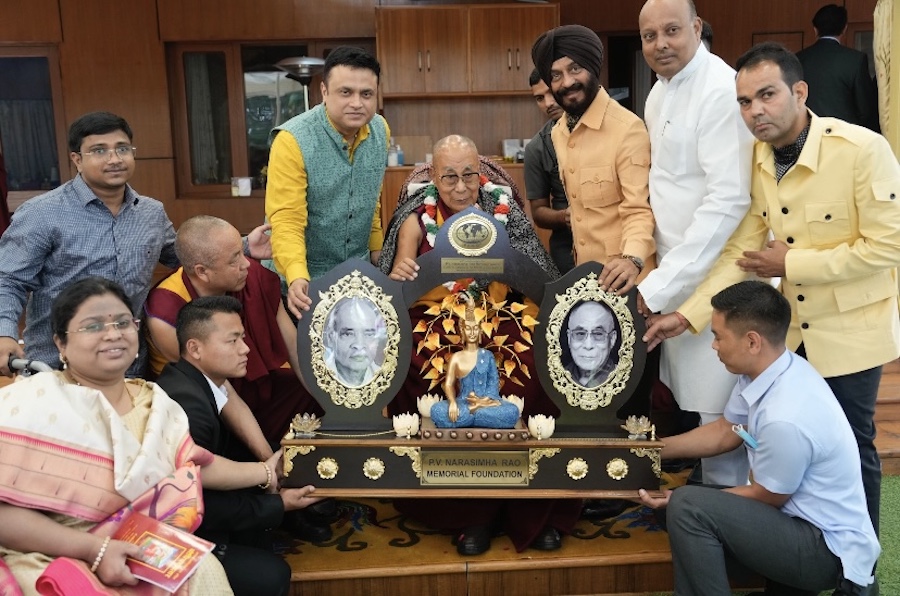
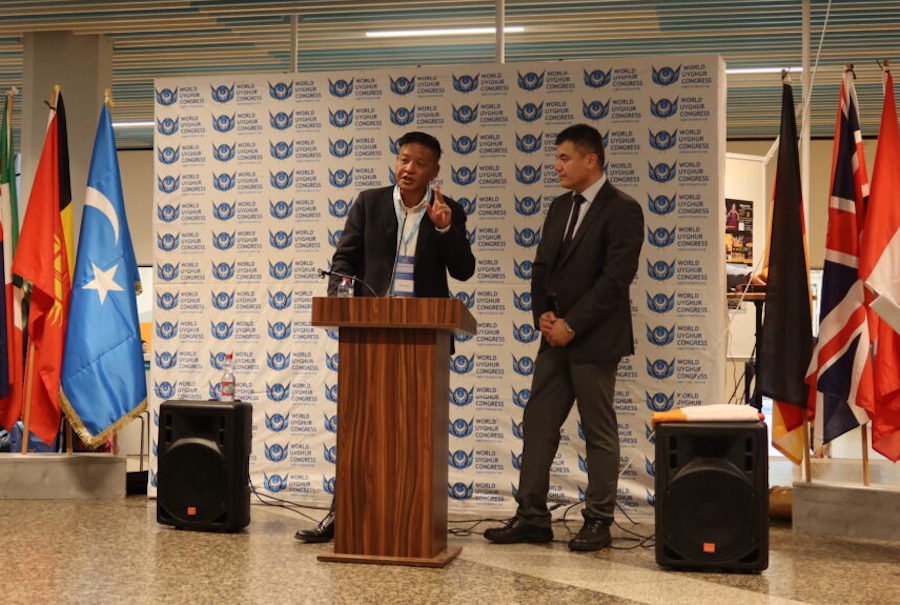
11 Responses
I have been writing letters to Tibetan Review when Prof Dawa Norbu was the editor. It was gracious of him that he even sent me a copy of the Review to acknowledge my letter which was about the closure of the Guerrilla Movement in Mustang in 1972. Dawa Norbu was perhaps the first Tibetan intellectual who made his mark by writing on Central Asian Affairs after he left Tibetan Review and received a doctoral Degree from the US and joined JNU as a professor. The Tibetan Review was the best for the young and highly motivated Tibetan activists of the era to keep track of news of Tibet and international developments about Tibet. He was a thinker ahead of the rest.
After Dawa Norbu, Tsering Wangyal became the Editor of the Tibetan Review. It continued relentlessly to disseminate the Tibetan narrative and had many contributors like Jamyang Norbu and many western Tibetologists. There were many ordinary young people including some ex-officials of the Tibetan Government in Lhasa and those Tibetans who were in the know about Tibet. Unlike today there were very few News out lets about Tibet in those days and the TR was the favourite Tibetan News portal of the young Tibetan generation then. I was fortunate that many of my letters got printed by Tsering Wangyal both on Buddhism and politics. I even managed to win an essay competition conducted by the Review.
So, the Tibetan Review has served us well and I sincerely hope it continues well into the future. I have never met Prof Dawa Norbu nor Tsering Wangyal but both of these editors made very significant contribution in disseminating information about Tibet without fear and favour during those early crucial days. Dawa Norbu almost got lynched in Dharamsala for writing an editorial which inferred that it’s not necessary to keep the status quo about Tibet’s leadership and any capable person should have the opportunity to serve Tibet. Some fanatical and elderly people took great offence to this remark and Called for his death. The strongest ones were coming from Nepal and the Tibetan Government sent Kalon Wangdu Dorje to calm ruffled feathers. But the Dalai Lama was full of praise in a circular that was distributed among Tibetans in Nepal. In it he said, “even the Buddha’s words cannot be taken literally and need through investigation. This is an Occassion which is akin to the blooming of fresh the flowers” alluding to Dawa Norbu’s new thinking.
Tsering Wangyal caused no ripples that ruffled the community’s conscience but was a dedicated man who did his job to the best of his ability. The rumours that circulated about him was that he was regular visitor to the Manjnu Tillaka Tibetan settlement for a drink or two which is only expected of any young man. The book in question will be judged by writers of repute and academics for its literary value but suffice it to say, the by gone generation of Tibetans from the 70’s and 80s have produced brilliant writers like Dawa Norbu, Jamyang Norbu, Tsering Wangyal, K Dhondup and others. These people were driven by the passion for their country, their people and the dream of a Free Tibet..
Topden has done terrific job of bringing alive Editor’s book with his wit, easy to read narrative and truthful combination of his own experiences. So many of us have crossed path with Editor and his book will be surely cherished. I wondered when Topden’s book is coming out? It will be a great read. How can I get a copy of Editor’s book?
In 1997, while working for UN High Commissioner for Human Rights in Cambodia, I mailed a porn movie to the Editor in Delhi. After a few months, I received a letter from the Editor saying that the video has traveled far and wide. The final destination is in Gangkyi, and the video had several reservations and did not expect to return soon to Delhi. Then, in the summer of 1998, I was on vacation and bought several beer cases and went to see the Editor at TCV Hostel. He made spaghetti and found he was a good cook too.
Spaghetti bolognese with red wine just the way Shahrukh liked in Don 2? Sounds yummy. I didn’t realize he was briefly residing in Gangkyi working for VOA before heading off to Ari.
Thubten Samphel la is right when the narrator, in beautifully-written “Falling Through the Roof”, says:
“..Tibetan Review was our new idea. It was our generation’s word. China had its People’s Liberation Army, but we the young Tibetan exiles had our Tibetan Review”.
Describing the Editor-la:
“That was when the Editor walked in and headed straight for the fridge. He put his round, chubby face in the fridge only to discover the beer gone. Thinking that his large round glasses were playing tricks on him again, he raised them and tried finding the bottle with his naked …”
Thanks to all for sharing great memories, including the foremost writers – Jamyang la, Topden la & and Thubsam Rinpoche la.
I have never known Editor but have heard a lot about him. I have no words to express my respect for his contribution to our independent journalism in English. It is crazy to think that 20-30 years we had an editor like him. Jamyang Norbu la, Dawa Norbu la, Tsering Shakya la – we should be indebted immensely to these guys for their literary contributions. I am excited to read Editor’s novel. I found Topden la’s review fascinating, very well written, and humorous, as is also his style. I still remember reading his essays on his Ani and thinking them as perhaps the best personal narratives in English ever by a Tibetan – his writing style is almost at par with the stuff you read in New Yorker. For the longest time I’ve heard he’s been working on a book but I don’t know for sure. I loved Tsering Wangmo Dhompa’s novel which I feel is another must have by Tibetan readers in English. Writing is not a very rewarding pursuit – especially these days and which is unfortunate- but we do need more novels, more books, just more writing especially from those who are good at it.
I was eagerly waiting to read this book, but this book review probably intentionally written in Tibetan Review writing style reminded me that the book also could have written in Tibetan Review style with words and style that only the writer could understand. This review unhooked my interest. I usually love Topden’s writings or to be more precise his Facebook posts. I hope Topden will keep his own free, witty, powerful and satirical writing style and write a book of his own someday.
It’s not on Amazon yet. Can’t wait to read Editor’s novel. He was such a great guy.
It might take years before it reaches the general public. Right now they’re giving away to near and dear, acquaintances, and “influential Tibetans’ like gifts. Blackneck says on Facebook to DM them for copies, for they have got money from Tibet Fund for free distribution. “Just pay the postage” one post read from an individual. But again, only the lucky few gets it, and the general public is left behind.
Try DMing them on fb:
https://www.facebook.com/BlackNeckBooks/
High Asia should have collaborated with Paljor Publication or any other publication who have proven record in marketing. Blackneck, now matter how genuine Tibetan it sounds, have zero experience in marketing.
“….and I looked up to this young man, older than us by eight or nine years”
Are you sure? I think you’re 20 plus years younger, because he was born in 1949, the same year as Jamyang Norbu la and late Dawa Norbu la.
Good write-up and keep it up.
I think you read wrong. Writer talks about his own experience with another man as example for name calling. I liked this because he did not give away the mystery but provide a context – nice touch. Loved the write up. Topden has a unique gift for writing and story telling prowess. Except he doesn’t write much. Thanks Phayul.
Oopsie. Story with a story. Cool.